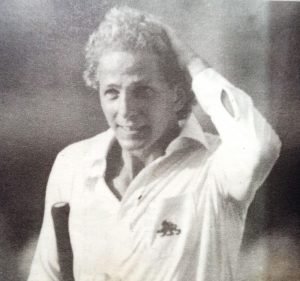This brief conversation took place between David Gower and Ahmer Khokhar in 1997. David Gower was an outstanding batsman of rare elegance who thrilled crowds wherever he played with wonderful wrist stroke play. Such was his popularity that when he was left out of the England touring party to India in 1992–93, some MCC members protested and forced a special meeting to discuss his exclusion.
He was primarily an entertainer rather than just an accumulator of runs. Gower led England to Test-series victories over India in 1984–85 and in 1985 at home to Australia, when the Ashes were retained. He is England’s highest run scorer in Test history, with well over 8000 runs at an average of 44.25 in 117 tests.
At the domestic level, he initially played for Leicestershire and then moved to Hampshire until his retirement in 1993. Ahmer Khokhar said I was fortunate enough to have the opportunity to talk to David before the start of play during the 4th Test at Headingley in 1997. I asked him several questions relating to the current state of the game as well as his thoughts on the direction that domestic cricket would take in the future.
David was characteristically polite during our conversation, as we discussed some of the topical issues that have aroused considerable debate amongst cricket lovers. The ECB Chairman, Lord MacLaurin, has presented his blueprint, which contains a list of recommendations on ways of improving the standard of the England team.
Although he is strongly in favor of the new proposals, David would have preferred a two-divisional system in the county championship. “At the moment, the present set-up in County Cricket is too comfortable. The counties must not be seen as separate entities. They must fit in with the overall aim, which is to improve the fortunes of the national team.
The England team must be the priority, and I feel that a shakeup in the County Championship will help to concentrate the talent at the domestic level and therefore help to improve standards at the international level. With two divisions in the County Championship, the best players would always be playing against each other, and it would be a good system to allow the movement of players between clubs.
I feel that a change is very much required, but I am not in favor of a return to uncovered pitches, which some people support.” David is also a supporter of some of the changes which are now being introduced into the game. “The use of TV replays should be extended if the umpires wish to use it in order to give those more of a chance to make any decision in which there is a strong element of doubt with the naked eye.
Also, the introduction of floodlights in test matches is sensible public relations because it will prevent the need to stop play if there is bad light, which will consequently keep the paying spectators happy.” Unlike many outspoken cricketers, he does not believe that any drastic action is necessary to speed up over-rates in Test matches.
“The present system of penalties is sufficient; if you started to find a team runs for bowling their over’s slowly, as some people have suggested, that idea would be unworkable. I don’t understand how a system of fining team runs could be implemented.”
David Gower played his final Test match for England against Pakistan at the Oval in 1992. He is now a well-respected journalist and television commentator. I asked him if he ever regretted that he was no longer playing. “The truth is that I don’t miss playing.” “Hence, I am thoroughly enjoying my new career. I enjoyed my time as a player, but that is over now.
The last few years were a bit up and down and not as much fun, but life moves on, and I am looking forward to developing my present career.” David Gower was surely one of the most attractive batsmen in the history of the game. His cover drives, “of which there were a few,” he modestly told me, were majestic, and his timing was exquisite.
He is a very warm and friendly person who is often pleased to take the time to sign autographs for his many admirers. He gave a lot of people all over the world a great deal of pleasure when he was playing. Now, he has brought a similar sense of fun and enjoyment to the BBC TV commentary box. David remains as popular as ever, and his time as a player will always be memorable, not least for those delightful cover drives!
Read About – Graham Gooch – The True Legend of England Cricket
